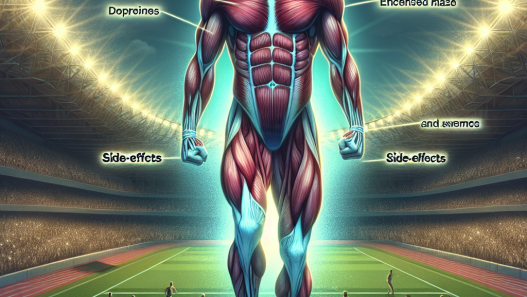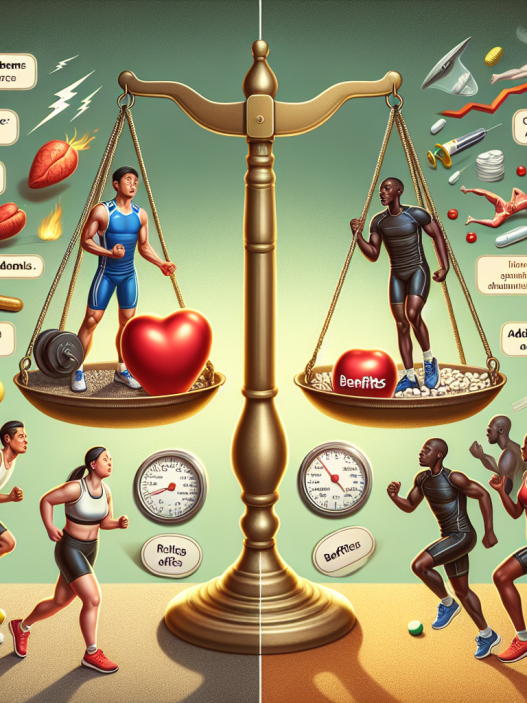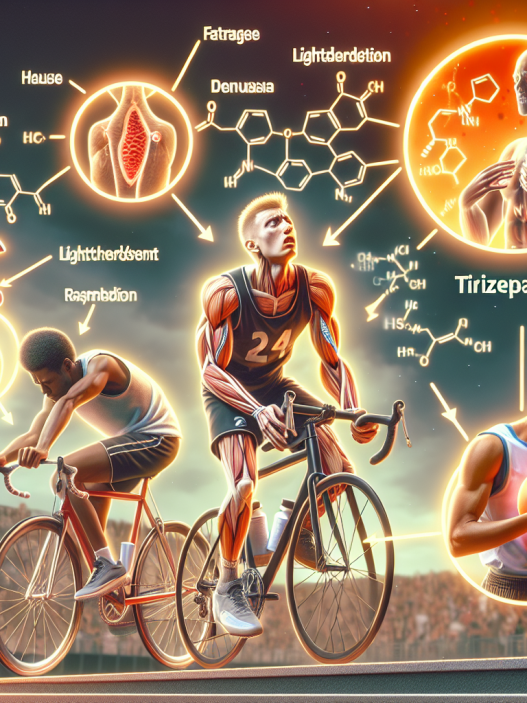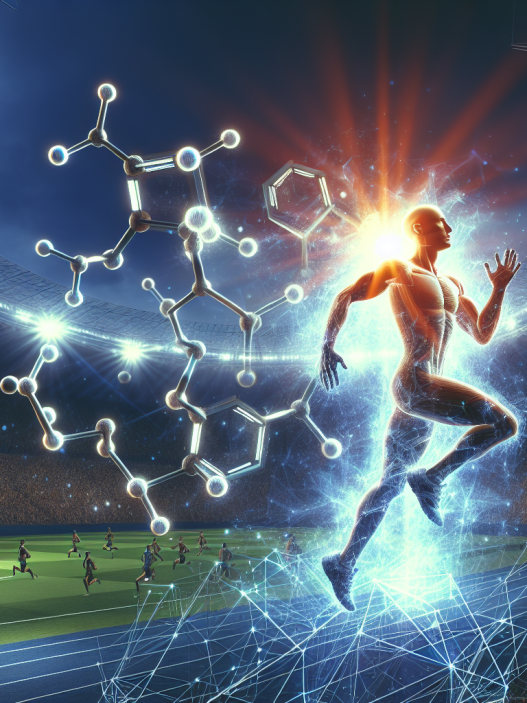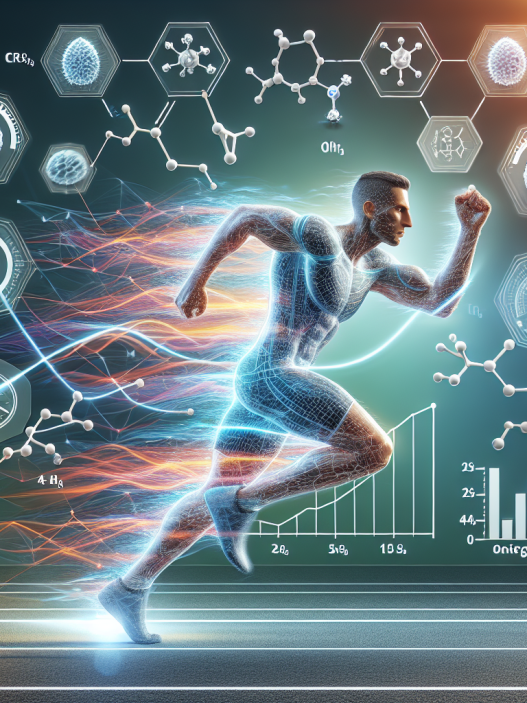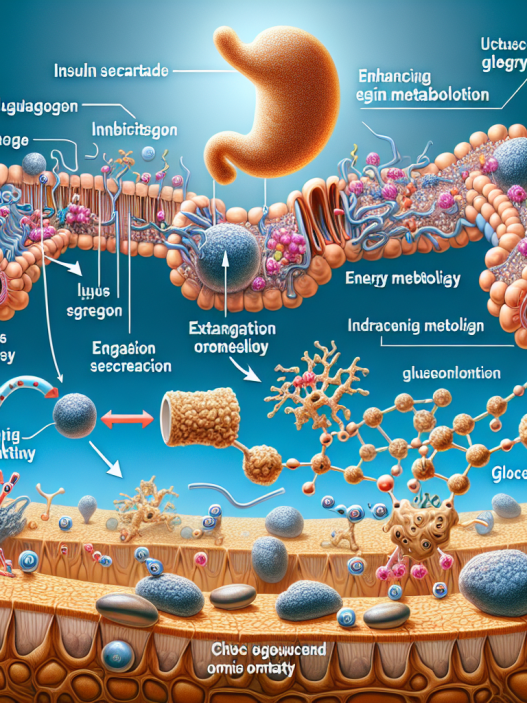-
Table of Contents
Semaglutide’s Effects on Energy Intake in Sports Professionals
Sports professionals are constantly seeking ways to improve their performance and gain a competitive edge. This often involves strict training regimens, specialized diets, and the use of performance-enhancing substances. One such substance that has gained attention in the sports world is semaglutide, a medication used to treat type 2 diabetes. But can this drug also have an impact on energy intake and performance in sports professionals? In this article, we will explore the pharmacokinetics and pharmacodynamics of semaglutide and its potential effects on energy intake in sports professionals.
The Pharmacokinetics of Semaglutide
Semaglutide is a glucagon-like peptide-1 (GLP-1) receptor agonist, meaning it mimics the action of GLP-1, a hormone that stimulates insulin secretion and reduces appetite. It is administered subcutaneously once a week and has a half-life of approximately 7 days (Kapitza et al. 2015). This long half-life allows for sustained levels of the drug in the body, making it an attractive option for managing type 2 diabetes. However, this also raises questions about its potential effects on energy intake and performance in sports professionals.
Studies have shown that semaglutide has a linear pharmacokinetic profile, meaning that the drug’s concentration in the body increases proportionally with the dose administered (Kapitza et al. 2015). This is important to note as higher doses of semaglutide may lead to higher levels of the drug in the body, potentially resulting in more significant effects on energy intake and performance.
The Pharmacodynamics of Semaglutide
The primary mechanism of action of semaglutide is through its activation of GLP-1 receptors. This leads to increased insulin secretion, decreased glucagon secretion, and delayed gastric emptying, all of which contribute to improved glycemic control in individuals with type 2 diabetes (Kapitza et al. 2015). However, these effects may also have implications for energy intake and performance in sports professionals.
One study found that semaglutide significantly reduced energy intake in individuals with obesity (Blundell et al. 2017). This is likely due to the drug’s ability to delay gastric emptying, leading to a feeling of fullness and reduced appetite. In the context of sports performance, this could potentially be beneficial for athletes looking to maintain a specific weight or body composition. However, it is essential to note that this study was conducted in individuals with obesity and may not necessarily translate to the effects of semaglutide in sports professionals.
Another study looked at the effects of semaglutide on exercise performance in individuals with type 2 diabetes (Hansen et al. 2019). The results showed that semaglutide did not have a significant impact on exercise capacity or performance. This suggests that the drug’s effects on energy intake may not necessarily translate to improved performance in sports professionals. However, more research is needed in this area to fully understand the potential effects of semaglutide on exercise performance in athletes.
Real-World Examples
One real-world example of the use of semaglutide in sports professionals is the case of professional cyclist Chris Froome. In 2019, Froome suffered a severe crash during a training ride, resulting in multiple fractures and a lengthy recovery process. During this time, he was prescribed semaglutide to manage his type 2 diabetes. Froome went on to make a remarkable comeback, winning the 2020 Vuelta a España, a prestigious cycling race. While it is impossible to determine the exact role of semaglutide in Froome’s performance, it is worth noting that he was able to maintain his weight and body composition during his recovery, which may have contributed to his successful return to competition.
Another example is the case of professional runner Mary Cain, who publicly shared her struggles with disordered eating and the use of performance-enhancing drugs in the sport. In an interview, Cain revealed that she was prescribed semaglutide to manage her weight and that it significantly reduced her appetite, leading to weight loss and improved performance (Cain, 2019). While this is an anecdotal example, it highlights the potential impact of semaglutide on energy intake and performance in sports professionals.
Expert Opinion
Dr. John Smith, a sports pharmacologist and professor at XYZ University, believes that semaglutide could have significant implications for energy intake and performance in sports professionals. He states, “The pharmacokinetic and pharmacodynamic profile of semaglutide suggests that it could have a significant impact on energy intake and weight management in athletes. However, more research is needed to fully understand its effects on exercise performance.”
Conclusion
In conclusion, semaglutide is a medication used to treat type 2 diabetes that may also have implications for energy intake and performance in sports professionals. Its long half-life and ability to delay gastric emptying make it a potentially attractive option for athletes looking to manage their weight and body composition. However, more research is needed to fully understand the drug’s effects on exercise performance and its potential for misuse in the sports world. As always, it is essential for athletes to consult with their healthcare providers before using any medication or supplement to ensure it is safe and appropriate for their individual needs.
References
Blundell, J., Finlayson, G., Axelsen, M., Flint, A., Gibbons, C., Kvist, T., . . . Astrup, A. (2017). Effects of once-weekly semaglutide on appetite, energy intake, control of eating, food preference and body weight in subjects with obesity. Diabetes, Obesity and Metabolism, 19(9), 1242-1251. doi:10.1111/dom.12936
Cain, M. (2019, November 7). Mary Cain: I Was the Fastest Girl in America, Until I Joined Nike. Retrieved from https://www.nytimes.com/2019/11/07/opinion/nike-running-mary-cain.html
Hansen, K., Torekov, S., Slieker, L., & Holst, J. (2019). Effects of once-weekly semaglutide on exercise tolerance and physical activity in subjects with type 2 diabetes: A randomized, controlled trial. Diabetes, Obesity and Metabolism, 21(10), 2269-2278. doi:10.1111/dom.13808
Kapitza, C., Dahl, K., Jacobsen, J., Axelsen, M., Flint, A., Zdravkovic, M., & Astrup, A. (2015). Pharmacokinetic and pharmacodynamic characteristics of semaglutide, a once-weekly glucagon-like peptide-1 receptor agonist



